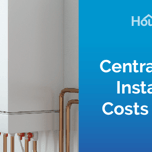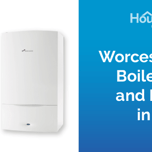Answer these simple questions and we will find you the BEST prices
Which type of solar quotes do you need?
It only takes 30 seconds
100% free with no obligation

Get up to 3 quotes by filling in only 1 quick form

Compare quotes and find yourself the best deal

Increase the value of your home by installing a new boiler
- Householdquotes.co.uk
- Boilers
- System Boiler Vs Combi Boiler
System Boiler Vs Combi Boiler: Which Is Best For Your Home?

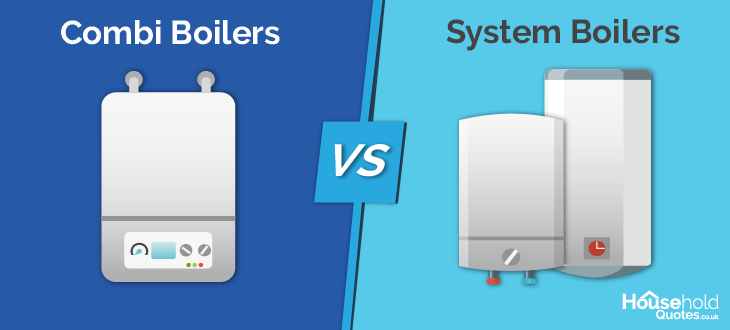
When it comes to choosing the right boiler type, you might be wondering which one is going to work best for you. System and combi boilers are the most common boiler types found in homes today. Combis are most often found in smaller homes, whilst system boilers are best in larger homes with higher hot water demands.
There are, however, many important differences between these boiler types that you need to consider before you choose one. In this article, we’ll look in detail at what separates these boilers, and help you discover which is best for your home, your budget, and your needs.
If you’re ready to install a new boiler but need some advice, don’t spend days tirelessly researching on your own - we’re here to help. Here at Household Quotes, we can put you in touch with expert installers in your local area so you can get the very best support in finding the right boiler for your home.
Avoid scrolling the internet looking for reputable installers, we’ve got them right here at the click of a button! By filling in our quick form, you can get up to 3 completely free, no-obligations quotes to compare. Don’t delay on keeping your home cosy this winter - click below to get started today!
- Quotes from local installers
- Payment by finance available
- Save up to £975
It only takes 30 seconds

System boiler vs combi: what are they and how do they compare?
System and combi boilers are the most common type of boiler found in our homes today. They can be run on gas, oil, or LPG (Liquified Petroleum Gas), and effectively provide hot water for our taps and radiators.
There are some key differences between them however which can determine which is better suited to a home.
Combi boilers come as one compact unit, which takes in water from a mains supply connection. The boiler then heats up this water and sends it directly to your radiators or hot water taps, ready to provide you with hot water on demand.
System boilers work in a similar way, as they take water in from the mains and heat it for circulation in radiators. However, when it comes to hot water for taps, the system boiler works alongside a hot water storage cylinder to keep a large store of water heated, and ready for use.
The system boiler has this additional storage element so that it can provide a larger quantity of hot water, simultaneously, for homes with multiple bathrooms, and a higher demand level. This is in contrast to the combi boiler, which can only provide enough hot water for small to medium-sized homes (typically those with one bathroom).
Key differences between combi and system boilers
In addition to the way they provide hot water, combi and system boilers differ in other aspects. The main areas of comparison include the space they require, the demands they can fulfil and the efficiency they provide. Below are some of these points for you to consider.
| Combi Boiler | System Boiler |
|---|---|
| Space | |
| A small, compact boiler that doesn’t require much space. Can usually be installed in a standard kitchen cupboard. Ideal for small homes. | A system boiler requires the boiler unit plus a large hot water cylinder. This can take up considerable space in a home. |
| Hot Water | |
| A combi is capable of providing water on demand. | Once you use all the hot water in a cylinder, you will need to wait for it to refill (up to 30 minutes). |
| Outlet Capacity | |
| Can only send hot water to a few outlets at once. Best for those with less than 2 bathrooms. | Is capable of supplying multiple outlets at the same time. Great for homes with high hot water needs/multiple bathrooms. |
| Efficiency | |
| Modern combi boilers usually operate at efficiency levels of 92% or more, which means they can offer cost savings on bills. | New system boilers can offer efficiency levels of 92% or more (this can differ by brand). |
If you’re considering either of these boiler types it’s important that you understand what demands you have and the space you can afford to use for a new boiler. Combi boilers are generally the more compact and easiest to install, however, system boilers are the most reliable for ample hot water if you have multiple bathrooms.
System boiler vs combi boiler cost
A key part of choosing the right boiler is making sure it’s also within your budget. Combi and system boiler prices can range from £500 to £3,000, but you must also account for installation costs. In addition, system boilers must have a storage cylinder to operate, which can add to this cost depending on the size you need.
No matter which boiler you opt for, the power you require from it will impact the cost. For example, the more radiators you have in your home, the more powerful the boiler you will need to run them. Boiler power (or output) is measured in kilowatts (kW) and you may find prices increase the more kW’s you need.
As a general rule, account for 1.5 - 2kW for each boiler in your home. This will ensure you get the ideal boiler size for your property, and avoid overpaying to run a boiler that’s eating more power than you need!
To give you an idea of system and combi boiler prices, below is a table of estimated figures per boiler type.
| Type of Boiler | Average Output (kWh) | Estimated Supply Cost | Total Estimated Cost (incl. installation) |
|---|---|---|---|
| Combi boiler | 18 to 35kW | £500 to £3,000 | £1,500 to £3,500 |
| System boiler | 15 to 65kW | £580 to £3,500 | £2,000 to £4,000 |
These prices are just guidance, as there are many factors which can influence new boiler costs. This includes things like boiler brand, fuel type you use, where you live, and which installer you choose.
System boiler vs combi boiler running costs
When it comes to working out the running costs of any boiler, there are a few things you need to know. Three main factors will determine the amount you spend, these are fuel type, boiler efficiency, and usage.
Firstly, the fuel type you use will have the most impact on the ongoing price you pay. For example, the price per kilowatt hour (kWh) of fuel for natural gas will differ from that of electricity or oil.
Secondly, the boiler's efficiency will determine the amount of heat you get from each unit of fuel you pay for. For example, a boiler with an efficiency level of 92% will mean that for every £1 you spend on fuel, only 8p of that will be lost during the heating cycle. So, the higher the efficiency, the more you get for your money.
The third factor to account for is your expected usage. The greater your demand for hot water, the higher your boiler’s output power level will need to be. For example, when you use the radiator sum (of 1.5kw per radiator) you get an idea of the power level you need. This kW output can give you a good estimate of how much money your boiler will spend per hour, based on the fuel you burn.
To get an idea of the running costs for a combi or system boiler, we’ve created the table below. This gives an estimate of costs for each fuel type, using a new efficient boiler (92%), with a typical average family home usage (11,500 kWh).
Each boiler type is running on a different power output in this example to demonstrate the difference between the demand levels of each boiler.
| Fuel Type | Tariff per kWh* (pence) | Combi Boiler Cost per Hour (20kW output) | System Boiler Cost per Hour (30kW output) | Annual Spend (Based on 11,500 kWh average) |
|---|---|---|---|---|
| Gas | 6.9p | £1.38 | £2.07 | £793.50 |
| Oil | 9.0p | £1.80 | £2.70 | £1,035.00 |
| LPG | 8.7p | £1.74 | £2.61 | £1,000.50 |
| Electric | 27.35p | £5.47 | £8.20 | £3,145.25 |
These costs are just guidance, as it’s difficult to estimate the exact running costs of combi or system boilers due to the many factors that make each home unique. Typically, system boilers will run a little higher in cost due to the fact they are made for larger homes with a high use demand.
Ready to replace your old boiler? If your existing boiler is very old, or costs you more to run year on year, it could be time to upgrade to a new, efficient model. To get advice from the experts, fill in our very simple form and in 30 seconds, we can help you access up to 3 free quotes.
Skip the hassle of hours of research and get the best possible prices from installers you can trust, with no-obligation comparison quotes. Don’t wait until your boiler lets you down, find the best deal on an upgrade in just a few clicks.
- Quotes from local installers
- Payment by finance available
- Save up to £975
It only takes 30 seconds

System or combi boiler: the pros and cons
As we’ve seen, combi boilers and system boilers are suited to different homes and circumstances. No matter which one is best for you, however, there are important advantages and disadvantages for both types of boiler which are worth considering.
These include additional factors such as the efficiency level, the space they require and the cost of the fuel type you need. All of these can be affected by the size or brand of boiler you decide on.
System and combi boiler advantages
Modern combi or system boilers will provide an excellent, reliable source of heat and hot water. Below are some of the other key advantages of owning one of these boilers.
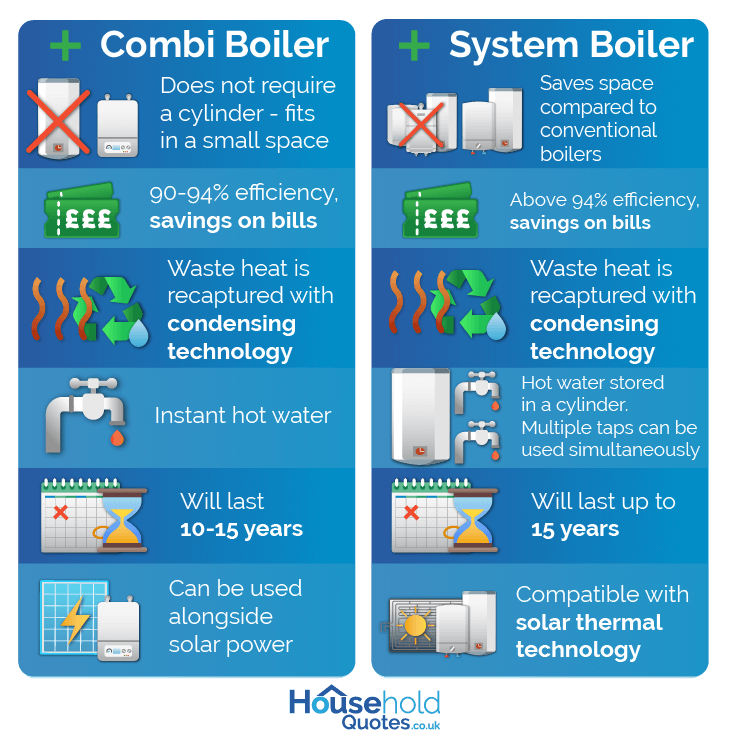
Combi and system boilers are highly efficient, effective solutions for small and larger homes. They can save you money on energy bills and are compatible with renewable energy options for an even greener home heating option.
System and combi boiler disadvantages
Modern boilers have many advantages that help you save money and heat your home. There are some aspects, however, you should consider before deciding which type to install. Below are some of the disadvantages you might experience if you have the wrong boiler type.
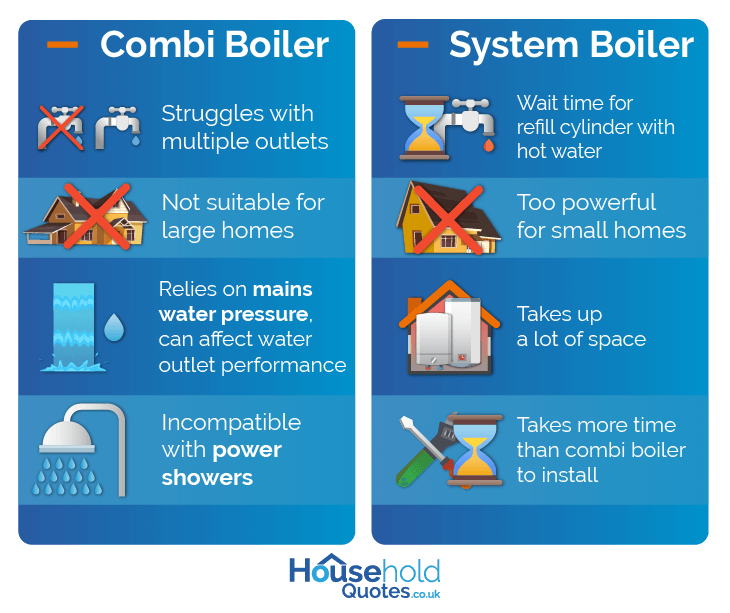
As you can see, system and combi boilers both have advantages and disadvantages which rely on them being used in the right circumstances. System boilers need more room and multiple bathrooms to be most effective, whilst combi boilers rely on small homes with good water pressure to be reliable.
Combi or system boiler: which one is more efficient?
Modern boilers are more efficient than ever before, and the introduction of certain legislation has even made it a legal requirement that gas boilers, in particular, operate above 92% efficiency. So how do we determine whether a combi or system boiler is more efficient?
Boiler efficiency is what determines how much you may spend on your energy bills, but it also indicates the kind of impact an appliance will have on the environment. The more efficient it is, the less energy is wasted or emitted as harmful gases.
There are two key ways that you should consider a measurement of a boiler’s energy efficiency.
To compare these boiler types, below is a list of the top five boiler companies with the efficiency ratings of some of their popular system and combi boiler models.
| Boiler Brands | Combi Boilers | System Boilers | ||
| Model | ErP Rating | Model | ErP Rating | |
| Worcester Bosch | Greenstar CDi Compact | A | Greenstar i System | A |
| Baxi | Baxi 800 Combi 2 | A | Baxi 800 System 2 | A |
| Ideal | Logic Max Combi | A | Logic Max System | A |
| Vaillant | EcoTEC Plus Combi | A | EcoTEC Plus System | A |
| Viessmann | Vitodens 050-W Combi | A | Vitodens 050-W System | A |
Combi or system boiler: which one is the best for your household?
As we’ve now discovered, there are many factors you should take into account before you decide whether a combi or system boiler will be best suited to your home.
Combi boilers are a popular solution for those seeking efficient, space-saving design and on-demand hot water. They are considered better for homes with less than 2 bathrooms so that you can enjoy good water pressure and enough hot water to heat your whole house.
For those with bigger homes, multiple bathrooms and high hot water needs, system boilers are the answer. These efficient boilers, and hot water cylinders, can ensure all your taps work simultaneously and that you have a good supply of hot water ready to use.
To make the best decision, consider factors like the size of your home, the number of bathrooms, available space, and your budget. If you're ready to take the next step and explore which boiler fits your needs, we recommend seeking professional advice from local installers.
Getting multiple quotes for a new boiler installation can help you find the cheapest heating system, but don’t waste time hunting for someone you can trust, spending days reading reviews, and getting baffled by various charges - instead, fill in one simple form with the click of a button.
In just 30 seconds we can gather the information we need to source you up to 3 free quotes from our network of qualified, trusted installers. There’s no obligation to accept any of the quotes you receive, and you will have access to the best advice and most competitive deals available.
Stay warm, save energy, and enjoy the benefits of the perfect boiler for your home. Click the link below to begin!
- Quotes from local installers
- Payment by finance available
- Save up to £975
It only takes 30 seconds

Frequently asked questions
Combi boilers are compact units which heat water directly from the mains supply, but system boilers need hot water cylinders to heat larger quantities. These differences mean they are suited to different-sized homes.
No, a system boiler usually costs more than a combi boiler due to the additional cylinder needed for it to operate. However, the cost per boiler type will depend on your home’s needs plus installation fees.
System boilers provide more hot water than a combi but cost more to run. Comparing the pros and cons before switching will ensure you find the best option for your home.
Yes. If you have recently renovated and fitted more bathrooms or radiators, you may find that your combi can no longer keep up with new hot water demands. Upgrading your boiler can fix this problem.

Becky has been bringing quality advice to homeowners since 2021. As an experienced writer, she is keen to help our customers find the help they need when they need it.


